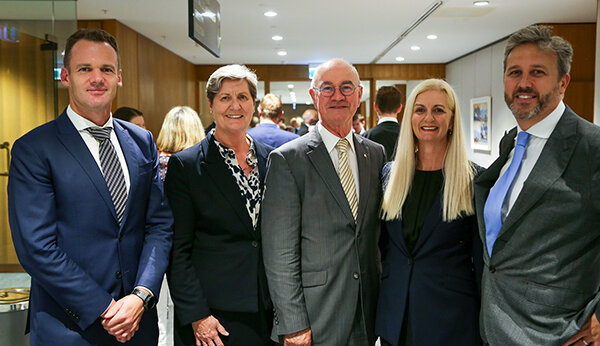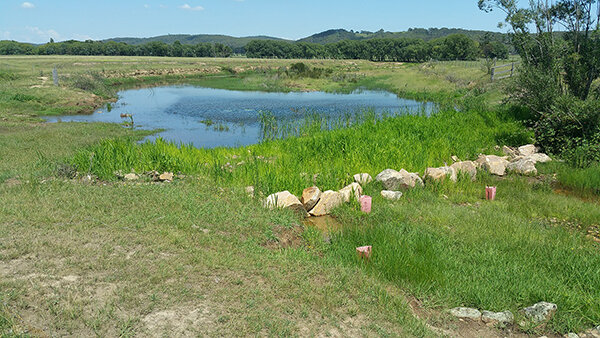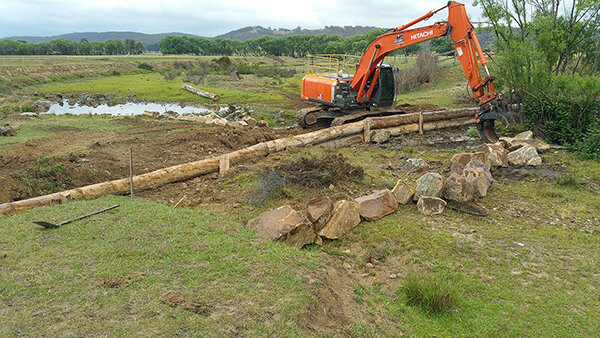The Land, by Stephen Burns, 30 April 2020
The landscape repair and rehydration concept promoted by The Mulloon Institute (TMI), a regenerative agriculture not-for-profit, is now the focus of suggested amendments to the legislative and regulatory process surrounding water and land management in NSW.
Wilfred Finn (AITHER, The Mullloon Law Committee), Trudy Sheehan (King & Wood Mallesons), Gary Nairn (The Mulloon Institute Chairman), Carolyn Hall (The Mulloon Institute CEO) and Matt Egerton-Warburton (Gadens, Chairman of The Mullloon Law Committee). Photo: Edgars Greste, Grow Love Project
Representatives from TMI, which focuses on regenerating agricultural landscapes, met recently with NSW Planning Minister Rob Stokes and NSW Water Minister Melinda Pavey, as well as Deputy Premier John Barilaro and NSW Agriculture Minister Adam Marshall, to discuss adjustments to the current approvals processes that are hindering farmers from building much needed landscape rehydration structures.
Led by TMI chairman, the Hon. Gary Nairn AO, the initial response from the NSW Government has been encouraging with ministers indicating they will ‘actively’ consider the proposed amendments.
Click image for film overview of the evening by Grow Love Project.
“We have approached the relevant Ministers to highlight the need for changes to be made to the water and planning legislation to enable landscape rehydration works to be done much more easily,” Mr Nairn said.
“We drafted some proposed amendments and we have given them to the Ministers who have passed them on to their departments to consider.”
Chairman of the Mulloon Law Committee, Matt Egerton-Warburton, said the amendments make the approval process easier for landowners to commence landscape rehydration on their property.
“At the moment the approvals that the landowner has to receive from governments and councils is so onerous that they are not conducting these works,” he said.
“When seeking to repair whole catchments (which typically have multiple landowners), current legislation and regulations requires individual approvals for each structure, submissions from each separate landowner in a catchment, different submissions to multiple departments (Planning, Water, Environment, etc) and the commissioning of expensive and time-consuming expert reports.”
“Compliance with these requirements is a significant administrative, legal and engineering process for landowners that costs significant amounts of time and money.”
“At its extreme, approval for one project took 30 months and cost $350,000, but cost less than $100,000 and took only three weeks to construct. Our legislation streamlines this process to expedite the establishment of landscape rehydration works while meeting necessary regulations.
“The limited money and time of our farmers should be spent repairing their landscapes, not trying to understand and fulfil lengthy compliance processes.”
Mr Nairn said legislation and regulations are a complex matter and the TMI recognise that situation has worked hard with the Mulloon Law Committee to put forward workable solutions to this matter.
“We want to slow the water but quicken the compliance process,” he said.
Leaky weir structure at Westview Farm showing results several months after construction. (February 2019)
Photo: The Mulloon Institute
Mr Egerton-Warbuton said the proposal is intended to recognise the effectiveness of the landscape rehydration concept.
“We have proposed a solution whereby if the leaky weir and the landscape rehydration works fit within the framework that the government has specified in the amendments and then the property owner can just go out there and build it – the works will be deemed either exempt or compliant development, requiring significantly less approvals,” he said.
“If we get the government on board not only to pass legislation but to produce a user friendly guide for landowners, then hopefully building these structures will be quick, easy and cheap.”
TMI CEO Carolyn Hall noted the proposal is a very significant milestone and TMI are excited by the progress made through the meeting with the Ministers.
“I think for the Institute it would really enable us to pursue our goal of 100 projects with great confidence and the Mulloon Rehydration Initiative itself would become a model to be scaled up and rolled out across the nation.”
Building the same leaky weir structure at Westview Farm. (November 2018) Photo: The Mulloon Institute
Mr Nairn said TMI were delighted to have received commitments from Ministers Stokes and Pavey to actively consider implementation of the proposed amendments.
“We would like to see a situation where, as long as the works comply with NSW codes, our farmers can just get out there, build these structures and repair their land,” he said.
“We have recently experienced drought, bushfires and floods, so never has effective water management been so crucial for our agricultural industry and sustainable environmental management.
“For farmers and graziers, landscape rehydration is a scientifically backed drought-proofing method for improving their properties and, importantly, allowing for returns to be generated in periods of severe drought, as we’ve recent seen.
“The laws in place protect the environment, biodiversity, water quality and supply.
“We believe our landscape rehydration structures fulfil these mandates.
“We’d like to see the regulations changed to recognise the value of these works and allow compliant projects to proceed with necessary certification attained later.”
Kindly reproduced with permission from Stephens Burns and The Land.
SOURCE: https://www.theland.com.au/story/6730380/proposed-amendments-to-enable-repair-of-landscape/



